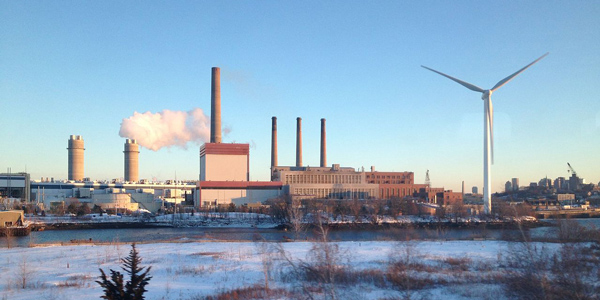By Michael Kuser
Exelon on Thursday filed with ISO-NE to retire its 1,998-MW Mystic Generating Station in 2022, but the company said it “may reconsider” the decision if the grid operator can reform its markets to properly value the plant’s contributions to reliability and regional fuel security.
The Everett, Mass., facility includes a 576-MW dual-fuel unit (Unit 7); two gas-fired units capable of producing a combined 1,414 MW (Units 8 and 9); and Mystic Jet, an 8.6-MW oil-fired peaker.
“Changes to market rules are necessary because critical units to the region, like Mystic 8 and 9, cannot recover future operating costs, including the cost of securing fuel,” Exelon said in a statement.
Absent regulatory reforms, “these units will not participate in the Forward Capacity Auction scheduled for February 2019,” Exelon said in a statement.
ISO-NE spokeswoman Marcia Blomberg told RTO Insider that Mystic is “one of the two largest generating stations on the regional power system. The ISO will conduct a study to ascertain how these retirements could affect power system reliability and will release the results as soon as possible.”
Exelon Power President Ron DeGregorio said it was “a difficult day not only for the talented men and women who have dedicated themselves to operating Mystic safely and reliably every day, but also for their families, their communities and all of their colleagues here at Exelon.”
Cost Recovery
Exelon’s announcement referred to a recent statement by the RTO that it “may propose interim and long-term market rule changes to address system resiliency in light of significant reliability risks” identified in its January 2018 fuel security report. (See Report: Fuel Security Key Risk for New England Grid.)
“To the extent that changes are timely filed and approved by the Federal Energy Regulatory Commission, Exelon Generation may reconsider the retirement of the Mystic units,” the company said.
FERC in September 2017 approved Exelon’s request for recovery of more than $1.5 million in fuel costs for the plant (ER17-933). The commission granted Exelon more than $1.5 million for Unit 8 and 9 fuel costs that were not recovered because of market power mitigation measures applied in October and November 2016. (See FERC Approves Cost Recovery for Exelon’s Mystic Plant.)
Fuel Security and LNG
Oil supplies at plants in New England declined rapidly during a cold snap earlier this winter as gas prices spiked and dual-fuel plants switched to oil, but the RTO avoided serious reliability issues thanks to LNG shipments.
Contributions from other types of generators were crucial during the cold snap, according to the RTO’s analysis.
“For instance, electricity produced by the Millstone nuclear station during the cold spell is equivalent to what could be produced by about 880,000 barrels of oil, and the power from the Mystic 8 and 9 units in Boston, which are fueled by LNG from the nearby Distrigas import facility, was the equivalent of more than 360,000 barrels of oil,” ISO-NE CEO Gordon van Welie said in February. (See Van Welie: ISO-NE in ‘Race’ to Replace Retirements.)
Exelon also announced Thursday it will purchase the Everett Marine Terminal, an LNG import facility, from ENGIE North America “to ensure the continued reliable supply of fuel to Mystic Units 8 and 9 while they remain operating.” No contract terms were disclosed.
The facility is the oldest such LNG facility in the U.S. and has connections with two interstate pipeline systems, the Tennessee and Algonquin pipelines, as well as with the local distribution system owned by National Grid.




